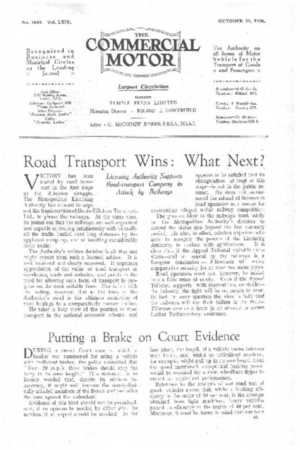Road Transport Wins What Next?
Page 35

If you've noticed an error in this article please click here to report it so we can fix it.
VICTORY has been scored by road transport in the first stage of the A-licence struggle. The Metropolitan Licensing Authority has refused to wipe out the trunk services of Bouts-Tillotson Transport, Ltd., to please the railways. At the same time, he points out that the railways are well organized and capable of dealing satisfactorily with virtually all the traffic hauled over long 'distances by the applicant company, and of handling considerably more traffic.
The Authority's written decision is all that one might expect from such a learned arbiter. It is well balanced and clearly reasoned. It expresses appreciation of the value of road transport in developing trade and industry, and points to the need for allowing each form of transport to progress on the most suitable lines. One. is left with the feeling, however, that at the back of the Authority's mind is the ultimate restriction of road haulage to a comparatively narrow radius.
He takes a long view of the position of road transport in the national economic scheme, and appears to be satisfied that its strangulation—at leapt at thg stage—is not in the public in terest. He does not recommend the refusal of licences to road operatorsas a means for overcoming alleged unfair railway competition.
• The greatest blow to the railways must surely be the Metropolitan Authority's decision to extend the status quo beyond the first currency period. He also, in effect, rebukes objectors who seek to arrogate the powers of the Licensing Authority in dealing with applications. It is clear that if the Appeal Tribunal upholds these views—and an appeal by the railways is a foregone conclusion — A-licensees will enjoy comparative security for at least two more years. Road operators must not, however, be misled into a false sense of safety. Even if the Appeal Tribunal supports—with reservations, no doubt— the industry, the fight will by no means be over. In fact, in some quarters the view is held that the railways will use their failure in the BoutsTillotson case as a lever in an attempt to secure further Parliamentary assistance.




























































































